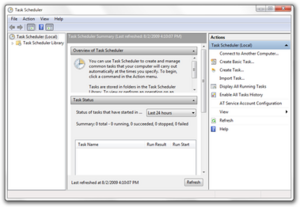Task Scheduler
| A component of Microsoft Windows | |
|---|---|

Management console for Task Scheduler 2.0 in Windows 7
|
|
| Details | |
| Other names | taskschd.msc |
| Type | Windows service |
| Included with |
|
| Replaces | System Agent |
| Service name | Task Scheduler (Schedule) |
| Description | Enables a user to configure and schedule automated tasks on this computer. The service also hosts multiple Windows system-critical tasks. |
| Related components | |
| Microsoft Management Console, Windows Event Log | |
Task Scheduler is a component of Microsoft Windows that provides the ability to schedule the launch of programs or scripts at pre-defined times or after specified time intervals: job scheduling (task scheduling). It was first introduced in the Microsoft Plus! for Windows 95 as System Agent but was renamed to Task Scheduler in Windows 98. The Windows Event Log service must be running before the Task Scheduler starts up.
This service should not be confused with the scheduler that allocates CPU resources to processes already in memory.
Task Scheduler 1.0 is included with Windows 2000, Windows XP and Windows Server 2003. It runs as a Windows Service, and the task definitions and schedules are stored in binary .job files. Tasks are manipulated directly by manipulating the .job files. Each task corresponds to single action. On Windows 95, Windows 98 and Windows Me, the Task Scheduler runs as an ordinary program, mstask.exe. It also displays a status icon in the notification area on Windows 95 and Windows 98 and runs as a hidden service on Windows Me, but can be made to show a tray icon. On Windows 2000, Windows XP and Windows Server 2003, it is implemented as a Windows service. Computer programs and scripts can access the service through six COM interfaces. Microsoft provides a scheduling agent DLL, a sample VBScript and a configuration file to automate Task Scheduler.
...
Wikipedia
